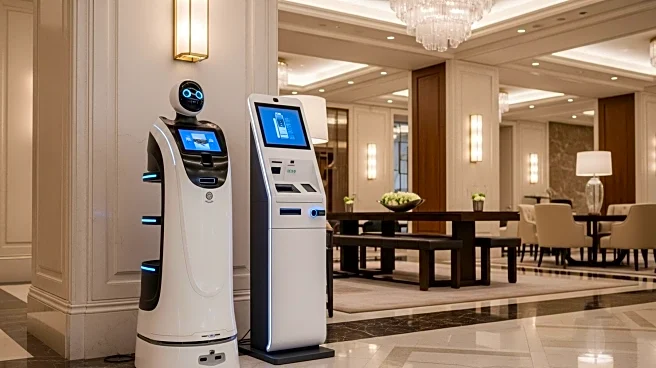What is the story about?
What's Happening?
The hospitality industry is undergoing a significant transformation with the integration of artificial intelligence (AI) into its operations. AI is no longer just a tool but a fundamental component that enhances various aspects of hotel management and guest interaction. From dynamic pricing models to personalized guest experiences, AI is embedded in everyday operations. OpenAI's collaboration with Shopify and Etsy has introduced conversational commerce, allowing users to make purchases directly through chat interfaces. This development is particularly impactful in hospitality, where AI can facilitate seamless booking and payment processes. Additionally, major online travel agencies like Booking.com and Expedia are leveraging AI to create personalized trip planners, shifting the focus from traditional search engines to conversational interactions.
Why It's Important?
The integration of AI in hospitality is crucial as it redefines guest experiences and operational efficiency. By automating routine tasks and providing personalized services, AI allows hotel staff to focus on enhancing human connections and creativity. This shift not only optimizes operations but also aligns with evolving consumer expectations for seamless and personalized experiences. The use of AI in dynamic pricing and revenue management can lead to increased profitability by optimizing room rates in real-time. Furthermore, the ability to conduct transactions through conversational interfaces can reduce friction in the booking process, potentially increasing conversion rates and customer satisfaction. As AI becomes more prevalent, hotels that adapt to these changes are likely to gain a competitive edge in the market.
What's Next?
As AI continues to evolve, its role in hospitality is expected to expand further. Hotels may increasingly rely on AI for decision-making processes, from pricing strategies to guest service enhancements. The collaboration between AI developers and payment platforms like Stripe suggests a future where transactions are seamlessly integrated into conversational interfaces, further streamlining the guest experience. Additionally, as AI systems become more sophisticated, they may offer even more personalized and context-aware services, enhancing guest satisfaction and loyalty. The ongoing development of AI-powered trip planners by online travel agencies indicates a shift towards more intuitive and personalized travel planning, which could redefine how travelers discover and book accommodations.
Beyond the Headlines
The integration of AI in hospitality raises important considerations regarding data privacy and security. As AI systems rely heavily on data to function effectively, ensuring the protection of guest information is paramount. Additionally, the shift towards AI-driven operations may require a reevaluation of workforce roles and skills, as employees will need to adapt to new technologies and focus on tasks that require human empathy and creativity. The cultural impact of AI in hospitality also highlights the need for a balance between technological efficiency and maintaining the essence of human connection that defines the industry.















